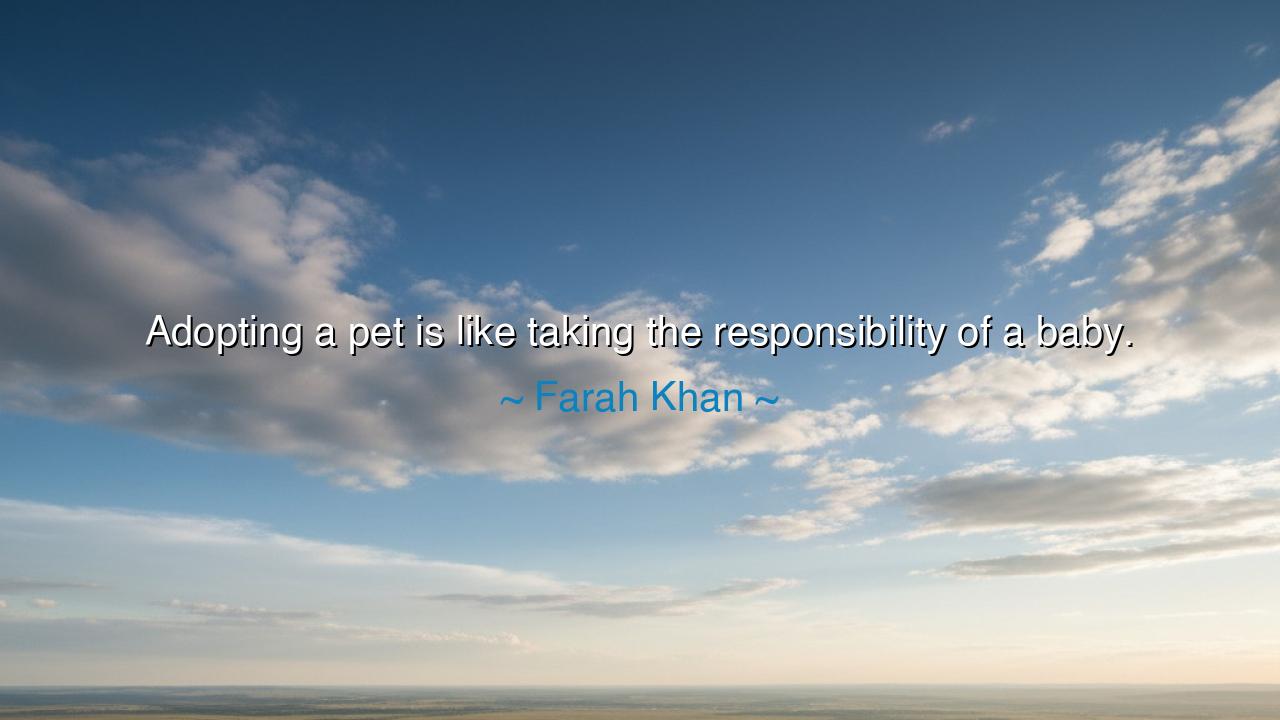
Adopting a pet is like taking the responsibility of a baby.






When Farah Khan declared, “Adopting a pet is like taking the responsibility of a baby,” she was speaking not only of animals and households, but of the sacred bond of care. Her words echo an ancient truth: that to bring another life under your protection is to bind yourself with duty, patience, and love. It is to become a guardian, a provider, and a teacher. What may seem to some a casual act—bringing home a pet—she elevates to the level of raising a child, for both require selflessness and the willingness to put another’s needs before one’s own.
The meaning is profound. A baby is helpless, dependent upon the love and vigilance of its parents for food, safety, and nurturing. In the same way, a pet, once brought into the home, depends utterly on its human companion. It cannot speak its needs, cannot fend for itself in the wilderness of human cities, cannot survive without care. To adopt is to accept this dependency, to acknowledge that another living being will shape your days, your decisions, and even your sacrifices. To ignore this truth is to invite suffering. To honor it is to awaken to a greater capacity for compassion.
History bears witness to this principle. In ancient Egypt, animals were not merely companions, but sacred beings. The cat, revered as a guardian of the home, was tended to with the same reverence given to a child. It is recorded that families would mourn deeply the death of a cat, shaving their eyebrows in grief, for they understood what Farah Khan reminds us today: the act of adopting is an act of covenant, a sacred agreement to give of oneself for the life of another.
There are countless modern examples as well. Consider the soldier returning from war, broken in spirit, who adopts a dog from a shelter. At first, the animal seems to be the one in need of care. But in truth, through the discipline of feeding, walking, and nurturing the dog, the soldier himself learns again how to live, how to rise each morning for the sake of another being. Just as the responsibility of a baby teaches patience, so does the care of a pet draw forth strength and healing in the one who shoulders it.
The lesson here is that responsibility is not to be feared, but embraced. To take on the care of a vulnerable being is to step into a higher form of humanity. It demands sacrifice of time, energy, and even comfort. Yet in return, it grants the immeasurable reward of love freely given—love that does not calculate or withhold. The pet, like the baby, reflects back the measure of care it has received, and in this reflection, the human heart finds its deepest joy.
In practical action, this means: do not adopt lightly. Ask yourself if you are ready to give, to serve, to rearrange your life for the sake of another. If you are ready, then commit fully. Provide food, shelter, affection, and time. Treat the life in your care not as property, but as kin. In doing so, you will not only give happiness to another creature, but you will also refine your own character, learning the sacred art of responsibility.
Thus Farah Khan’s words stand as a gentle yet powerful reminder: “Adopting a pet is like taking the responsibility of a baby.” It is a call to see beyond convenience, to reject selfishness, and to recognize that every act of care ennobles us. For in every baby, and in every pet, there is the same silent plea: “Protect me, guide me, love me.” And in answering that plea, we become not only caretakers, but truer versions of ourselves.






AAdministratorAdministrator
Welcome, honored guests. Please leave a comment, we will respond soon